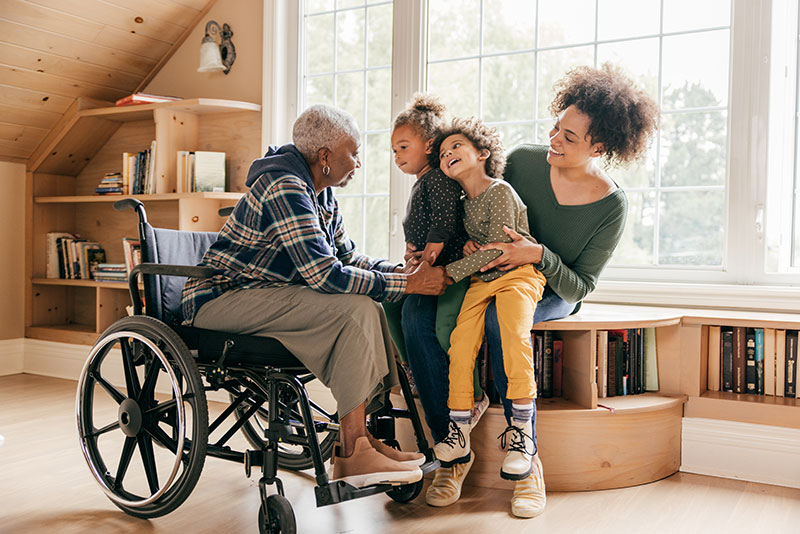Search Results for "senior health"
Why Won’t Mom Eat? It Might Just Be an Eating Disorder.
If you’ve been wondering, “Why won’t Mom eat?” it’s important to know the signs of an eating disorder.
Changes in appetite and weight are often considered a normal part of aging. But if you find yourself asking, “Why won’t Mom eat?” it’s important to consider all possible reasons. While factors like medication side effects, dental concerns, or reduced mobility can certainly play a role, there’s another potential cause that often goes unnoticed: eating disorders in seniors.
Yes, There’s Help for Chronic Fatigue in Older Adults
Learn how to recognize and better manage chronic fatigue in older adults.
Some mornings, the snooze button is your best friend—offering a few extra precious moments of rest. But for many older adults, fatigue is more than just morning grogginess; it’s an all-encompassing exhaustion that seeps into every part of their day. As one chronic fatigue sufferer vividly described, “I feel like my battery is permanently drained. It’s as if I’m a dish rag that’s been wrung out and left with nothing to give.”
The Checklist You Need After the Death of a Loved One
This checklist will help guide you through necessary steps after the death of a loved one.
After the death of a loved one, the grief can be all-encompassing, and the last thing you may feel ready to tackle is a series of responsibilities and tasks. Yet these steps are necessary to honor their memory, ensure their wishes are carried out, and settle their affairs. While the process may seem overwhelming, breaking it down into smaller, manageable actions can make it more bearable.
We’ve created a detailed guide to help you through this difficult time.
Immediate Actions
Obtain the Legal Pronouncement of Death: When a loved one passes away in a hospital or nursing home, the staff will automatically take care of this step. However, if the death occurs at home, call 911 to arrange transportation to the hospital where … Read More »
The Creative Dementia Care Strategy You Need to Try
Improv is one creative dementia care strategy that can be both effective and fun.
Creativity, adaptability, and a healthy dose of lighthearted fun are some of the top ingredients to healthy and effective dementia care. It stands to reason then that a spontaneous activity like improvisation is a great way to connect and engage with someone struggling with cognitive challenges. Not only does it allow you to pivot and embrace unexpected plot twists, but this creative dementia care tactic helps you to learn more about the person in your care.
How to Overcome Family Denial of Home Care Needs
If you’re encountering family denial of home care needs for an older loved one, these tips will help everyone come to a place of agreement.
When you begin to notice the red flags that care in the home is required for someone you love, it’s very common for that individual to resist the idea. After all, acknowledging the need for assistance is not easy, especially for somebody who prizes their privacy and independence. Yet what do you do when you encounter family denial of home care needs for an older loved one? When you’ve reached an impasse within your family in regards to the need for senior care, there is one potential culprit to consider: denial.
Why Would a Family Member Deny the Need for Care in the Home?
Denial is a coping mechanism employed to protect against … Read More »
Tips to Overcome the Challenges of Medical Tests for Older Adults
Ease the process of medical tests for older adults with these tips.
There’s often nothing “routine” about a routine checkup. You may arrive to your appointment perfectly fine, but leave with orders for blood work along with other medical tests a doctor recommends to keep you as healthy as possible. These tests may be nothing more than a minor inconvenience for you, but medical tests for older adults could be challenging for many reasons: transportation problems, mobility issues, thinner skin, fragile veins, cognitive difficulties, and much more.
Feeling Bored as a Caregiver? Try These Ideas!
Identifying the signs of substance misuse in older adults is the first step towards getting them help.
It’s not unusual for Dad to enjoy a glass or two of wine with dinner, but lately, you’ve noticed that he’s gravitating towards stronger drinks more frequently, and earlier in the day. He might say it helps with sleep or eases the aches of arthritis, but is there more to be concerned about?
Getting to the Root of Restlessness in Dementia
Uncover the reason behind restlessness in dementia in someone you love by answering these key questions.
Pacing. Fidgeting. Wandering. When you begin to notice these signs in someone you love with dementia, it’s time to take action before they escalate to agitation, aggression, or leaving the home. But figuring out why the person is feeling restless in dementia is sometimes half the battle.
Dysphagia Tips: Using Beverage Thickeners for Swallowing Disorders
These dysphagia tips will help someone you love adapt to beverage thickeners.
Unless you have dysphagia, a swallowing disorder, it is likely you have not given much serious thought to the various textures and consistencies of the liquids in your daily diet. When you are feeling thirsty, nothing hits the spot like an ice-cold glass of water. On a hot summer day, you may crave a cool milkshake. And when you are recuperating from the flu, a warm bowl of soup really hits the spot.
Could Alzheimer’s Disease Be an Autoimmune Condition?
Could Alzheimer’s disease be an autoimmune condition? Find out here!
Finding a cure for Alzheimer’s has become as tangled as the tau threads long thought to be the root cause of the disease. But now, research workers may be drawing one step closer to unraveling the puzzle of Alzheimer’s, by using a different train of thought. New studies are leaning towards the potential of an inflammatory response in the brain, which poses the question: could Alzheimer’s disease be an autoimmune condition?

















